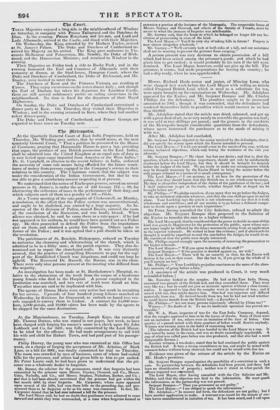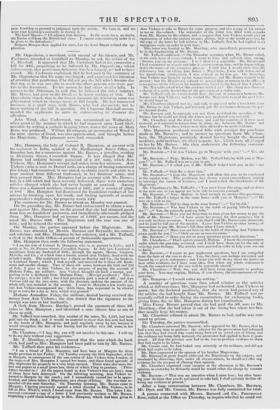Messrs. Richard Heale senior and junior, of Mincing Lane, who
were charged last week before the Lord Mayor with selling an article
called Prepared British Leaf, which is used as a substitute for tea, were again brought up for examination on Wednesday. Mr. Adolphus appeared for the Excise, and Mr. Serjeant Bompas and Mr. Charles Phillips for the defendants. The penalties sought to be recovered amounted to 7001. ; though it was contended, that the defendants had rendered themselves liable to penalties which would amount to no less than 60,0001.
Mr. Adolphus stated that the article was dried, coloured, and got up with a great deal of art, so as very nearly to resemble the genuine tea-leaf; it was sold at two shillings per pound ; and the grocers in the outskirts of the Metropolis bought considerable quantities from the defendants, whose agent instructed the purchasers as to the mode of mixing it with tea.
After Mr. Adolphus had concluded,
Mr. Serjeant Bompas objected to the notice received by the defendants, that it did not specify the statute upon which the Excise intended to proceed. The Lord Mayor—" I wish you would come to the merits of the case, without raising technical objections, which only betray the weakness of the side you advocate."
Mr. Serjeant Bompas—" My client has but one desire; and that is, that the question, which is one of extreme importance, should not only be satisfactorily conducted before the Lord Mayor, but that it should be brought for decision before the Judges of the land. We are ready to make any arrangements which may be thought necessary by the Excise Board to bring the matter before the only proper tribunal in a matter of so much consequence." The Lord Mayor—" I am anxious, as I sit here for the protection of the public, that they should know that this British tea is not wholesome beverage. My duty is altogether independent of the duties of the gentlemen of the bar ; and I shall endeavour to get at the truth, whether forged bills or forged tea be brought before me." ,
Mr. Phil l i We pledge ourselves, if you agree that we go before the Judges, to take no technical objection whatever, and, that the case shall go upon its merits
alone. Your Lordship says the article is not wholesome--we say that it is both wholesome and nutritious ; and all our anxiety is to go before a tribunal compe- tent to decide upon a question of such importance."
Sir Peter, having consulted the City Solicitor, refused to admit the objection. Mr. Seijeant Bompas then proposed to the Solicitor of the Excise to transfer the case to a higher tribunal.
The Lord Mayor said, that he considered that the power to decide in cases of this kind was given to Magistrates for the protection of the public, upon whom seri-
ous injury might be inflicted by the delays necessarily arising from an application to the superior tribunals. He wished to hear the evidence ; and if afterwards he thought it would be expedient to send the case before the Judges, be would do so. He considered that the public were deeply interested.
Mr. Phillips argued strongly upon the necessity of removing the prosecution to the higher tribunals. The Lord Mayor—" Will you agree to destroy all the stuff ?" Seijeant Bompas—" If the question is decided against us, we will." The Lord Mayor—" There will be no security in that, for the Excise will destroy it for you in that event. But the fact is, if you give up the whole of it you'll sustain no loss." Mr. Phillips—" Your Lordship's prejudice convinces us the more of the abso- lute necessity of going before aJury."
[A specimen of the article was produced in Court, it very much resembled bohea.]
Mr. Farraday looked at the samples. He had at the East India House, examined two parcels of the British leaf, and they resembled these. They were very like tea; but he could not give an accurate opinion without a close exami- nation. It appeared to bins that the samples were in imitation of teas; and if mixed with tea, they might deceive him. Sloe-leaf was injurious and differed materially from tea. He derived benefit from tea, but he had not tried whether he could derive benefit from the British leaf.—(Laughter.) Mr. Phillips—" Are not many persons injuriously affected by China tea?" Witness—" No doubt of it. To me its medicinal operation has proved ser- viceable."
Mr. W. A. Hunt, inspector of teas for the East India Company, deposed, that the samples appeared tohim to be the leaves of shrubs. Some of them were not an imitation of tea, others were an imitation of the dust of bohea. One quarter of a pound mixed with three-quarters of bohea would deceive anybody. Witness was twenty years in the habit of examining teas. [The infusion of the British leaf was handed to the Lord Mayor in a cup. It was tasted by many in the room, and was no doubt exceedingly unpalatable. A cup of what was called pure bohea was also produced, and that also had a most disagreeable flavour.] Another witness, a tea-dealer, stated that he had cautioned the public against the British leaf. It bore a strong resemblance to tea, and might be mixed with common bohea without being observed, but could not be mixed with fine tea: Evidence was given of the seizure of the article by the Excise on Mr. Heale's premises.
Mr. Serjeant Bompas argued against the possibility of a conviction in such a case. No partnership between the defendants had been proved, and there had been no identification of property; neither was it stated in what parish the offence imputed was committed.
The Lord Mayor, after having consulted with the City Solicitor and Mr. Hobler, said that the objection was fatal to the information. He must quash the information, as the partnership was not proved.
Serjeant Bompas—" Then you pronounce us not guilty."
The Lord Mayor—" I am obliged to quash the information."
Mr. Adolphus—" In manner and form, the defendants are not guilty; but I have another application to make. A warrant was issued for the seizure of cer- tain leaves manufactured in imitation of tea. It has been seized, and I call upon
your Lordship to proceed to judgment upon the article. We have it, and we want your Lordship's authority to destroy it."
The Lord Mayor—" I'll adjourn that decision. In the mean tine, no doubt, the Excise will keep the British leaf close. I cannot conscientiously order it to be given to the defendants."
Sergeant Bouipas then applied for costs, but the Lord Mayor refused the ap- plication.



















 Previous page
Previous page